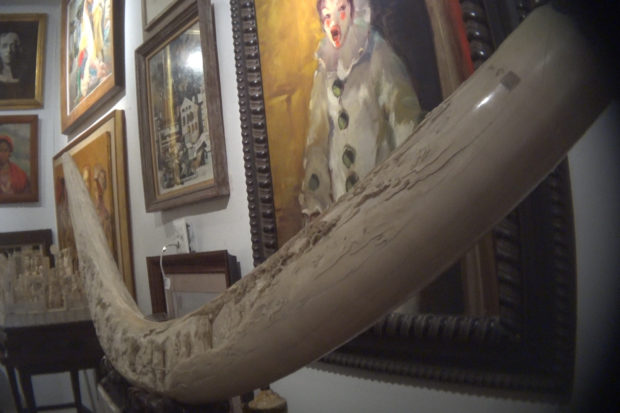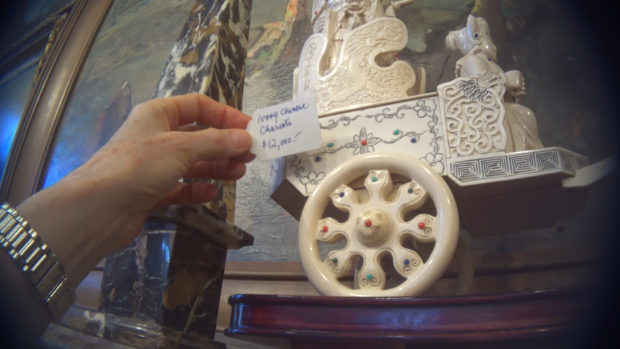
Our investigators uncovered hundreds of thousands of dollars worth of ivory objects for sale at businesses in Washington, D.C., including a full, carved elephant tusk priced at $600,000. Photo by the HSUS
Despite growing awareness about the havoc wreaked upon elephants by ivory poachers, our country – and our nation’s capital – are among the world’s biggest markets for ivory. Today, we’re releasing our latest investigation that has uncovered hundreds of thousands of dollars worth of ivory objects for sale at businesses in Washington, D.C., including a full, carved elephant tusk priced at $600,000 and an ivory game board with multiple ivory figurines priced at $48,000.
Between April and July, HSUS investigators visited local businesses in the city, including L’Enfant Gallery, Frank Milwee Antiques, Mercedes Bien Vintage, Capital Antiques D.C., and vendors at the Georgetown flea market. They discovered dozens of ivory figurines, trinkets and jewelry for sale. In most cases, the sellers were unable to provide documents to verify the age or origin of the ivory, and they were often glib in their responses to questions about the items. But without documentation, it is impossible to know whether these items were imported in violation of federal law.
It isn’t well known, but Washington, D.C. has recently gained notoriety as one of our country’s most active markets for the sale of elephant ivory. In 2017, the wildlife organization TRAFFIC found 658 ivory items for sale at 68 locations in the greater Washington, D.C. area. That’s far more than that what was found in other U.S. metropolitan areas surveyed in the same report, and three times the amount found for sale in the Washington area in a similar 2006 survey. And a 2015 report by the International Fund for Animal Welfare identified our nation’s capital as one of the top five markets for ivory sales occurring on Craigslist.
The reason this trade continues to thrive here, as it does elsewhere in the country, is that there is an absence of clear laws imposing a ban on ivory sales. It’s a gap in policy that vendors can exploit to their benefit: when there’s a legal market for these products, it provides a cover for illegal products to flourish since it’s quite easy to mix the two.

In most cases, the sellers were unable to provide documents to verify the age or origin of the ivory, and they were often glib in their responses to questions about the items. Photo by the HSUS
Federal regulations are also deficient in that they do not cover ivory sales within state borders. That’s why we have been working hard to bring about change at the state and local levels and already, 10 states, including California, Hawaii, New Jersey, New York, Nevada, Oregon, Washington, Illinois, New Hampshire and Minnesota, have passed bills and measures banning trade in ivory and other wildlife products.
There’s now a bill in Washington, D.C. that would do the same. At a press conference this morning to release the investigation, I joined Washington, D.C. councilmember Mary Cheh, who authored that bill, to discuss its scope and provisions. The legislation has the backing of a number of councilmembers and citizens in Washington, and we will be putting our full might behind it to ensure it passes.
Humane Society International has been at the frontlines of the battle to end the poaching and trafficking of wildlife, including our ongoing campaign to ban the ivory trade in Japan. We are working with governments internationally to end these practices, and to educate consumers about their role in helping to defeat them. But we cannot be a convincing voice globally if we fail to check our own country’s contribution to this problem.
Elephants suffer at the hands of poachers who slaughter them or sometimes remove their tusks while the animals are still alive. This brutal activity has contributed to a sharp decline in the global population of elephants, pushing this magnificent species toward extinction. In 2016, the Great Elephant Census revealed a staggering loss of 30% of the African savannah elephants between 2014 and 2017 in the African countries surveyed, primarily due to poaching.
The HSUS and HSI have already conducted four similar investigations, in Hawaii, Oregon, Massachusetts and Maryland, to expose the extent of the ivory trade, and we will continue to raise awareness and press the case for reform until our country is no longer abetting in the suffering of some of our world’s most precious wildlife.
The post HSUS/HSI undercover investigation reveals thriving market for ivory in Washington, D.C. appeared first on A Humane World.
Enviroshop is maintained by dedicated NetSys Interactive Inc. owners & employees who generously contribute their time to maintenance & editing, web design, custom programming, & website hosting for Enviroshop.
